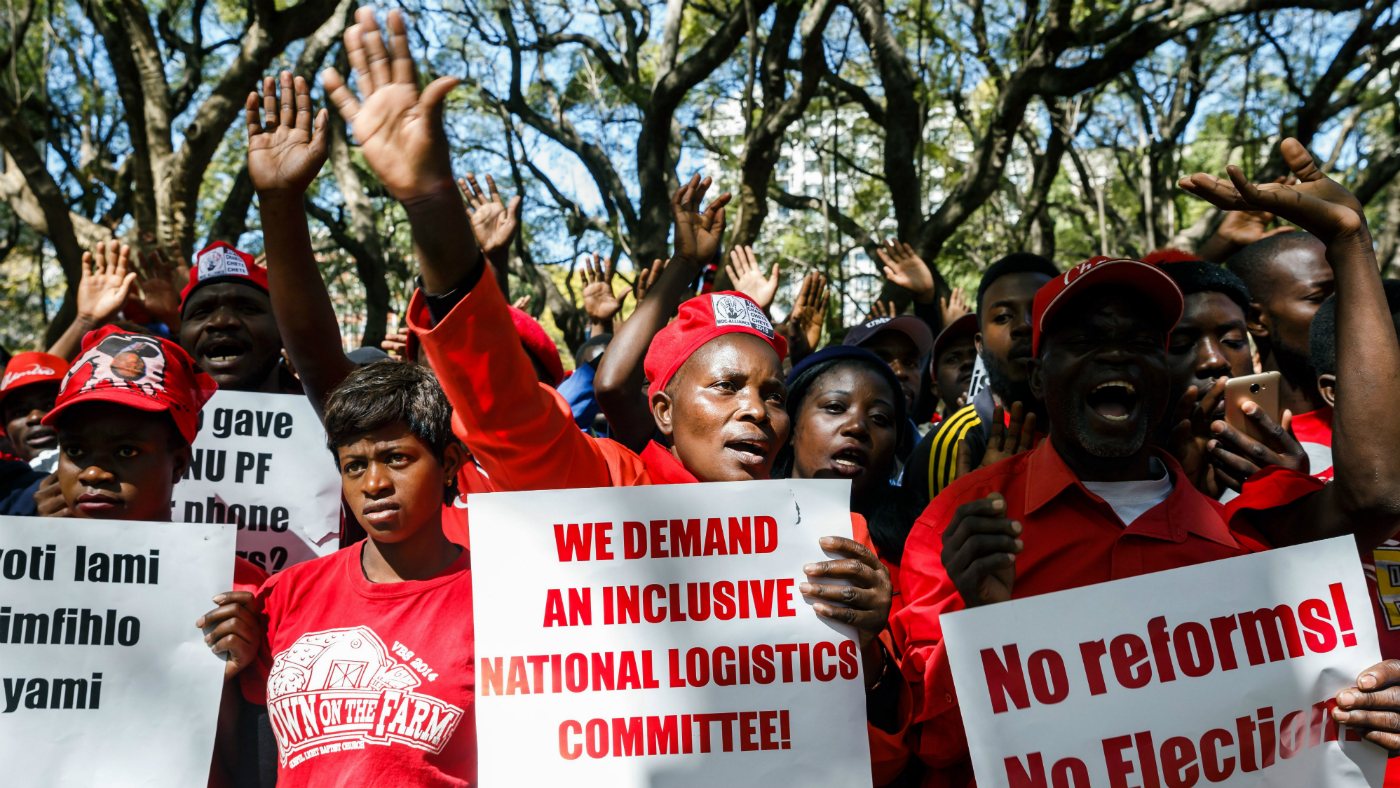Zimbabwe elections: will the vote be free and fair?
After decades of authoritarian rule under Robert Mugabe, Zimbabweans remain apprehensive

A free daily email with the biggest news stories of the day – and the best features from TheWeek.com
You are now subscribed
Your newsletter sign-up was successful
Zimbabweans go to the polls today in the first election since former president Robert Mugabe was removed from power in November last year.
Emmerson Mnangagwa, president and leader of the ruling Zanu-PF, is standing against more than a dozen other candidates, including Nelson Chamisa from the Movement for Democratic Change (MDC), the country’s main opposition alliance.
Polls suggest that Mnangagwa, 75, has a narrow lead over Chamisa.
The Week
Escape your echo chamber. Get the facts behind the news, plus analysis from multiple perspectives.

Sign up for The Week's Free Newsletters
From our morning news briefing to a weekly Good News Newsletter, get the best of The Week delivered directly to your inbox.
From our morning news briefing to a weekly Good News Newsletter, get the best of The Week delivered directly to your inbox.
The vote is the first time in two decades that the ballot will not feature Mugabe and MDC leader Morgan Tsvangirai, who died of cancer earlier this year.
Tensions have already begun to rise ahead of the election, with opposition parties taking to the streets in protest after alleged voting irregularities were reported last week.
Will elections be fair?
For the first time since 2002, EU and US observers have been invited to monitor the vote. “We have nothing to hide,” said President Mnangagwa, who has promised free and fair elections.
A free daily email with the biggest news stories of the day – and the best features from TheWeek.com
But ordinary Zimbabweans still have serious concerns, according to a recent Afrobarometer survey. One third think their vote will not be counted, nearly half believe an incorrect result will be announced, and 40% predict there will be violence after the announcement.
While observers “have avoided saying outright that the campaign season has not been free and fair, human rights organisations and opposition groups are compiling an ever-growing number of reports of electoral malpractice,” the Washington Post reports.
Thousands of opposition supporters took to the streets of the capital Harare last week to protest against the Zimbabwe Election Commission after alleged irregularities in the voters’ roll.
Allegations that some police and security officers cast their postal ballots at police stations - in violation of electoral law – have raised further questions about the election’s credibility.
But an article in the state-owned daily newspaper argues that western officials - and journalists - have already made up their minds.
“One gets the feeling that whatever the government does, Zimbabwe’s election should never get the pass mark,” The Herald reports. “It is a justification for continuation of US sanctions on Zimbabwe, Mugabe or no Mugabe.”
Who will win?
The Daily Express reports that opinion polls in the country have “given former intelligence chief Mnangagwa only a slim lead over his much younger rival”, but adds that polls “are not entirely reliable”.
Chamisa has reportedly told the BBC that he is “confident of victory” in today's election.
"We are not losing this election," he said. “We are winning this election. I'm not interested in hypotheticals - we will win this election to the extent it's free and fair - especially in the rural areas. It's a done deal.”
But one of the MDC Alliance’s main hazards is the split vote, says South Africa’s Independent Online. “Many of its best-known politicians are standing as independents, which might deliver unexpected victories for Zanu-PF,” it reports.
.
-
 Health insurance: Premiums soar as ACA subsidies end
Health insurance: Premiums soar as ACA subsidies endFeature 1.4 million people have dropped coverage
-
 Anthropic: AI triggers the ‘SaaSpocalypse’
Anthropic: AI triggers the ‘SaaSpocalypse’Feature A grim reaper for software services?
-
 NIH director Bhattacharya tapped as acting CDC head
NIH director Bhattacharya tapped as acting CDC headSpeed Read Jay Bhattacharya, a critic of the CDC’s Covid-19 response, will now lead the Centers for Disease Control and Prevention
-
 Epstein files topple law CEO, roil UK government
Epstein files topple law CEO, roil UK governmentSpeed Read Peter Mandelson, Britain’s former ambassador to the US, is caught up in the scandal
-
 Iran and US prepare to meet after skirmishes
Iran and US prepare to meet after skirmishesSpeed Read The incident comes amid heightened tensions in the Middle East
-
 Israel retrieves final hostage’s body from Gaza
Israel retrieves final hostage’s body from GazaSpeed Read The 24-year-old police officer was killed during the initial Hamas attack
-
 China’s Xi targets top general in growing purge
China’s Xi targets top general in growing purgeSpeed Read Zhang Youxia is being investigated over ‘grave violations’ of the law
-
 Panama and Canada are negotiating over a crucial copper mine
Panama and Canada are negotiating over a crucial copper mineIn the Spotlight Panama is set to make a final decision on the mine this summer
-
 Why Greenland’s natural resources are nearly impossible to mine
Why Greenland’s natural resources are nearly impossible to mineThe Explainer The country’s natural landscape makes the task extremely difficult
-
 Iran cuts internet as protests escalate
Iran cuts internet as protests escalateSpeed Reada Government buildings across the country have been set on fire
-
 US nabs ‘shadow’ tanker claimed by Russia
US nabs ‘shadow’ tanker claimed by RussiaSpeed Read The ship was one of two vessels seized by the US military